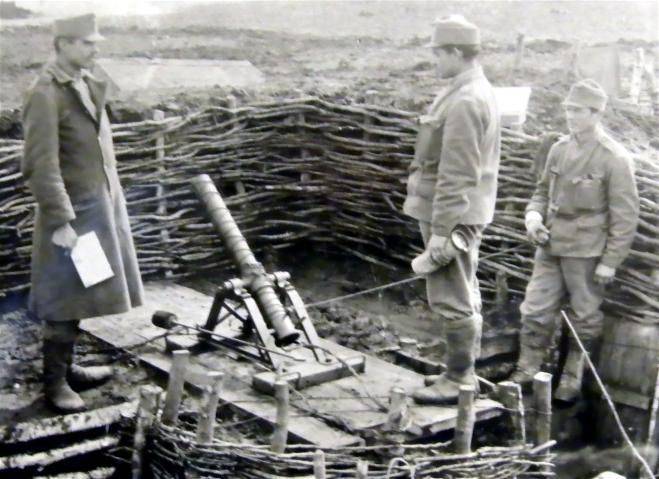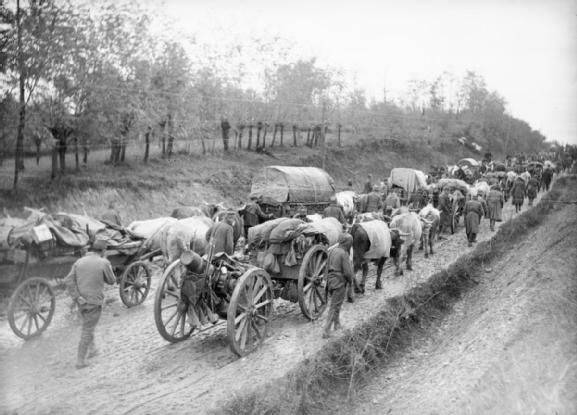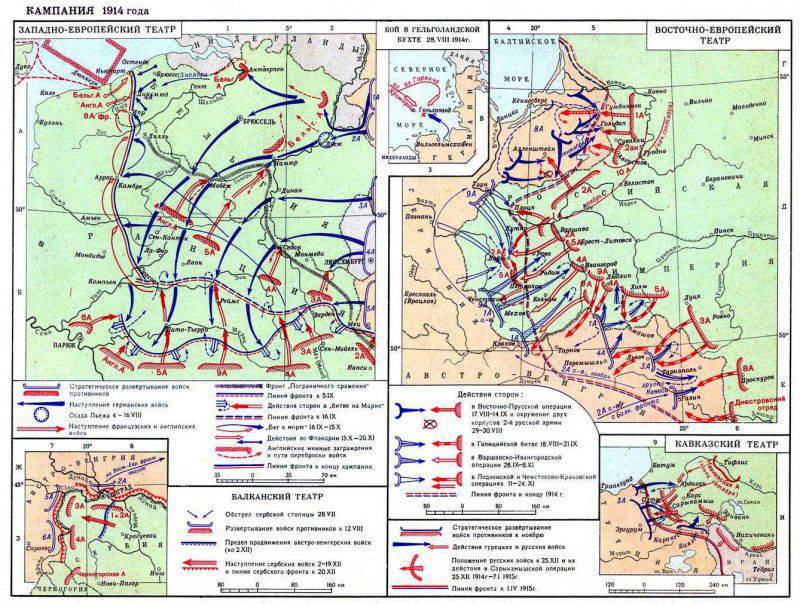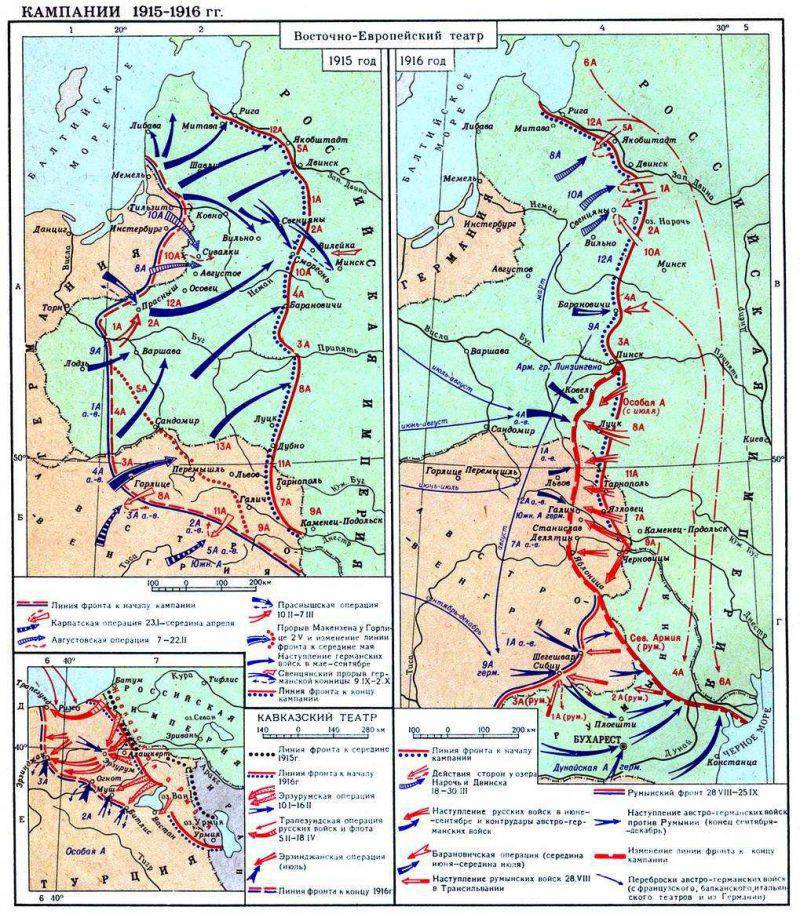Austria-Hungary retained the Eastern Front only with the help of Germany
In the Austro-Hungarian Empire, as in other countries, the beginning of the war was greeted with enthusiasm. The country was seized by an unexpected and unprecedented rise in the national spirit and chauvinistic moods. However, it soon became clear that this was not a victorious hussar walk through the Balkans, but a protracted, bloody and hard war. And most importantly - failed to localize the war on one front. Austria-Hungary had to fight bloody battles on two fronts - the Russian and the Balkan. Severe defeats on the Russian front and Serbia, the difficulties of wartime quickly washed away the patriotic sentiments.
Even before the start of the war bad signs appeared. For 15 months before the start of the war with the Russian Empire, the head of the Austro-Hungarian military counterintelligence Colonel General Staff Alfred Redl handed over to the Russians a plan for the invasion of Serbia and the fortifications and fortresses in Galicia, carefully developed by the Austrian General Staff. Redl was recruited by Russian intelligence back in the 1903 year (he was “caught” on homosexual relationships), and for a decade he handed out Austrian agents to Russia in Russia. Redl accidentally exposed, he committed suicide. But the deed was done, his information helped Serbia to confront the Austrian army.
Active hostilities unfolded in Galicia in 20-x of August. The Austro-Hungarian troops, whose left flank in Poland was covered by the German Kummer group, were able to press the Russian army under Krasnik and Komarov. But the left flank of the Russian army oppressed the Austrians and the situation in the Lviv region was grave. By that, the units of the 2 of the Austrian army were delayed and began to arrive at the front only in early September. The 3 and 8 Russian armies reached Lviv and were able to create a threat to the flank and rear of the left flank of the Austro-Hungarian army.
The Austro-Hungarian command was forced to withdraw troops across the river San. August 21 Russian troops took Lvov, and August 22 - Galich. By mid-September, 1914, Eastern Galicia and most of Bukovina with Chernivtsi were in Russian hands. The Russian army laid siege to the powerful fortress of Przemysl, where 130-thousand was blocked. Austro-Hungarian group. Russian troops went to the Carpathians. Galician battle was lost by the Austrian army. Austro-Hungarian troops lost about 400 thousand people killed, wounded and captured. The Austro-Hungarian army, especially its officer corps, suffered such damage from which the entire war could not recover. Further, the Austrians could fight only with the support of the Germans. The plans of the German General Staff to keep the entire Eastern Front forces only destroyed by the Austro-Hungarian army.
In late September, the German command organized an offensive against Ivangorod and Warsaw. The operation involved the 1-I Austro-Hungarian army V. Dunkl. However, the offensive failed. Austro-German troops were defeated and rolled back. Only the indecision of the Russian command did not allow the Russian army to develop an offensive, launching a deep invasion of Germany. In early October, the Supreme Austro-Hungarian Command planned to launch a new offensive in Galicia, unlock Peremyshl and liberate Lviv. However, after the defeat of the Austro-German troops in the Warsaw-Ivangorod operation, the Austro-Hungarian offensive in Galicia was stopped. The war on the Russian (Eastern) front acquired a positional character.
On the Serbian front, the Austrians also failed to achieve quick success (Serbian front of the First World War; The defeat of Austria-Hungary in the 1914 Serbian campaign of the year. Battles on the river. To the nucleus and at the Mine). The Serbs repelled several attempts by Austro-Hungarian troops to break through their defenses. In August, the Austro-Hungarian forces were defeated during a bloody battle on the Drina River. In November, the Austro-Hungarian army was able to defeat the Serbs and in early December captured Belgrade. But soon the Serbs launched a counter-offensive and on December 15 fought off the capital. A significant part of the blame for the defeat of the Austrian army on the Serbian front lay with the commander of the Austro-Hungarian troops in the Balkans, General Oscar Potiorek, who turned out to be a completely mediocre commander. At the end of the year he was dismissed and replaced by the Archduke Eugene. By the end of 1914, the Austro-Hungarian army lost more than 270 thousand people killed, wounded and captured in Serbia. At the same time, the Austrian army was practically at the initial positions.
Thus, the war on the Eastern Front for Austria-Hungary began unsuccessfully. The Austro-Hungarian army was defeated in Galicia, suffered serious losses. The combat capability of the army was undermined. There was a threat of a breakthrough of Russian troops through the Carpathians to Hungary. Austria-Hungary alone could not hold back Russia. On the Balkan front, the situation also did not meet the expectations of the Austro-Hungarian command. Serbia could not be withdrawn from the war. Moreover, in the Balkans there were heavy battles in which the Austro-Hungarian army suffered heavy losses.
The Habsburg Empire was forced to wage a heavy war on two fronts. The plan for an “easy walk” in the Balkans, as dreamed in Vienna, failed. From the very first failures in Galicia and in Serbia, the Austro-Hungarian Empire had to exert all its forces. If in the summer of 1914, the Austro-Hungarian army numbered 415 thousand soldiers with a population of 51 million people, then after mobilization the army was reduced to 1,8 million people. In total, during the war years, 8 million people had to be called in, which caused serious damage to the national economy. In general, the war cost the Hapsburg state great sacrifices: more than 1 million killed, 1 million 943 thousand people wounded and almost 1,7 million prisoners (480 thousand people died in captivity).
Crisis phenomena in the economy of Austria-Hungary have been outlined before the war. There was a noticeable decline in business activity, investment declined, unemployment increased. A major role in this was played by the loss of the Serbian market and two Balkan wars, which had devastating consequences for the economy of the Danube power. Due to the customs war with Serbia, the rupture of traditional economic ties with the Balkan markets were in decline and whole sectors of the Austrian economy were ruined, enterprises were closed. The textile industry was particularly affected. The only industry that benefited from the Balkan wars and the outbreak of World War I was the military industry. The military industry had to expand production to meet the sharply increased needs of the army and fleet. The war caused dramatic changes in the country's economy, including agriculture and transport.
Military expenditures increased greatly, which amounted to a huge amount of 70 billion crowns (of which Hungary accounted for 25 billion). The emergency laws of 1912 on exceptional measures and military supplies began to operate even before the announcement of mobilization. Emergency laws have created a legal framework for state intervention in the country's economy and in society as a whole. The regulation of prices for food, raw materials and centralized distribution has begun; regulation of military production; the rights and freedoms of citizens were limited, including the appearance of forced labor. At the beginning of the war, state orders strengthened the position of a number of industries, unemployment disappeared. But it was a temporary improvement. Austria-Hungary was not able to wage a war of attrition, it did not have enough funds and resources for this.
The morale of the army was undermined. At the end of 1914 - the beginning of 1915, the imperial and royal army for the first time encountered the unreliability of some units. First of all, this concerned the Czechs, who did not want to fight against the "Slavic brothers." The Czechs began to surrender without resistance. It is clear that before the mass decomposition was still far away. However, it was obvious that the morale of the units formed in the Czech Republic and the Serbian regions of Hungary is much lower than that of the regiments, where the majority were Austrian Germans, Magyars (Hungarians), Romanians, Croats, Slavic Muslims and Ukrainian nationalists. In order to avoid manifestations of mass surrender, desertion and disloyalty to commanders, the command began to fill up unreliable regiments with spare battalions consisting of Austrian Germans, Hungarians and Croats.
Both sides actively used nationalistic sentiments in their own interests. 16 August 1914 was the manifesto of Commander-in-Chief of Grand Duke Nikolai Nikolayevich to the Poles. The Grand Duke promised to restore the Polish people cut into pieces (the ethnic Polish lands were ruled by Vienna and Berlin) “under the scepter of the Russian Tsar”. As part of the Russian army began to create alien formations - the Polish Pulawski Legion (in 1917, the Polish Infantry Division was transformed into), the Polish Infantry Brigade, the Czech squad that fought in Galicia and the Czechoslovak Infantry Brigade (created in 1916 year). In the Czech formations initially served the Czech subjects of the Russian Empire, then they began to write down Czech and Slovak prisoners who expressed a desire to fight against Germany and Austria-Hungary. In 1917, the 1 Czechoslovak Corps was formed, which will be used by the Entente to incite the Russian Civil War.
The Vienna court also aroused in Poles the hope of restoring a united Poland, but already under the supreme power of the Habsburgs. The leaders of the Polish nationalists Y. Pilsudski and I. Dashinsky conducted negotiations with the Austrian authorities on the creation of Polish volunteer units in the Austro-Hungarian army. By the end of 1915, the number of Polish volunteers who fought for the Hapsburgs reached 20 thousand. In addition, the Austrian authorities used Ukrainian nationalists. In the autumn of 1914, a regiment of “Sich Riflemen” was formed under the command of A. Varivoda.
1915 Campaign
The German General Staff decided in 1915 to deliver the main blow to the Russian army, defeat it and lead Russia from the war. The 1915 campaign of the year began with a fierce oncoming battle in the Carpathians. The Russian command prepared an offensive operation, with the aim of breaking through the Carpathian line and entering Hungary. However, the Austro-Hungarian command also planned an offensive with the aim of freeing Przemysl. The Austrian attack was supported by German troops. It was one of the biggest battles of this war. In a bloody battle, both sides lost about 1 million 800 thousand people, but did not achieve strategic results. However, the victory was formally on the side of Russia. Russian troops captured Przemysl, more than 115 thousand people were taken prisoner.
2 May, the Austro-German troops launched a new offensive between the Vistula and the Carpathians, in the area of Gorlice. Despite the heroism of the 3-th Russian army of General Radko-Dmitriev, the superior enemy forces — 11-I German army of General Mackensen, deployed from the Western front and 4-I of the Austro-Hungarian army of Archduke Joseph Ferdinand, broke through the Russian defense. At the same time, the Germans launched an offensive in East Prussia. Russian troops were forced to retreat. The strike of the Austro-German group developed the offensive and in June occupied Przemysl and Lviv. The enemy went into the rear of the Russian army. 22 June, the Russian army began a strategic retreat from Poland. In the course of the Great Retreat, the Russian army left Galicia, Bukovina, part of the Baltic states and Belarus, and Russian Poland.
Thus, the Russian army suffered a heavy defeat, leaving a number of territories, including those conquered during the 1914 campaign of the year. However, the Austro-German army could not solve the main task - to withdraw Russia from the war. And the Russian army, although it suffered heavy losses, retained its combat capability and fighting spirit. In addition, the Russian army was able to overcome the supply crisis, and the situation with artillery and ammunition returned to normal by the end of the year. Russian military industry began to increase production. But the economies of Germany and Austria-Hungary were overstretched, the life of the population continued to deteriorate.

Austrian mortar calculation in a gun trench
For the Austro-Hungarian Empire, the 1915 offensive of the year had its negative consequences. It became obvious that the Austro-Hungarian army was not able to independently conduct full-scale offensive operations against Russia. Only with the help of the German military machine, the Austrians managed to keep the front in the Carpathians at the beginning of the year, and then go on the offensive. The 11 of the German army played a leading role in the breakthrough of the Russian defense. The general management of the operation was carried out by the German General August von Mackensen. Militarily, the power of the Habsburgs quickly became a satellite of Germany’s equal ally.
In addition, the Austrians had to start fighting on a new front - Italian. The Entente actually just bought Rome, offering more than the Central Powers (Italian "jackal" enters the war). 23 May Italy declared war on the Austro-Hungarian Empire. However, in combat, the Italians were even worse than the Austrians. An attempt by the Italian army in the late spring and summer of 1915 to break through the powerful Austrian defense on the Isonzo River did not lead to success. The Austrian troops, relying on powerful defense lines prepared in advance and natural obstacles (the mountains and the Isonzo River), with little support from the Germans, were able to repel the Italian offensive (Battle of the Isonzo; Second Battle of the Isonzo). Italians could not realize a numerical advantage. The Italian front also switched to a positional war. True, in strategic terms, the opening of a new front was beneficial to Russia, since it diverted part of the Austro-Hungarian troops to Italy.
On the Balkan front, the position of Austria-Hungary improved. Until the fall, there were no active hostilities on the Serbian front. All the forces of the Danube power were connected on the Eastern Front. After the Great Retreat of the Russian army, the Austro-German command transferred large forces to the Serbian sector. German forces led by Mackensen. October 5 Austro-German troops launched an offensive. October 14 Bulgaria declared war on the Entente countries and attacked Serbia. The Serbs were forced to fight on two fronts against superior enemy forces. Anglo-French assistance arrived very late, and Romania did not let Russian troops through its territory. The Serbian army was defeated and retreated through Albania. Serbs were evacuated to Corfu and Bizerte. The Anglo-French forces withdrew to Greece, forming the Front of Thessaloniki. Thus, in December 1915, Serbia and Montenegro was occupied by German, Austrian and Bulgarian troops.

Evacuation of the Serbian army to Albania, 1915
As a result, the 1915 campaign of the year was generally successful for Austria-Hungary. The Austro-Hungarian and German armies were able to inflict a heavy defeat on the Russian army. Austrian troops captured Galicia, Bukovina, recaptured Przemysl and Lviv. Austro-German troops finally defeated Serbia. The Serbian government and army had to leave the country. Serbia and Montenegro were occupied. Bulgaria joined the camp of the Central Powers, which strengthened the position of Vienna on the Balkan Peninsula. However, Vienna and Berlin suffered a heavy diplomatic defeat in the struggle for Rome. Italy acted on the side of the Entente, formed the Italian front. To fight the Italians, the Austrian command had to deploy troops from the Balkans and the Russian front. In addition, the war of attrition led to a deterioration in the internal situation of Austria-Hungary. The first negative phenomena have already appeared, in the future they will become one of the prerequisites for the destruction of the Austro-Hungarian Empire.
To be continued ...


Information